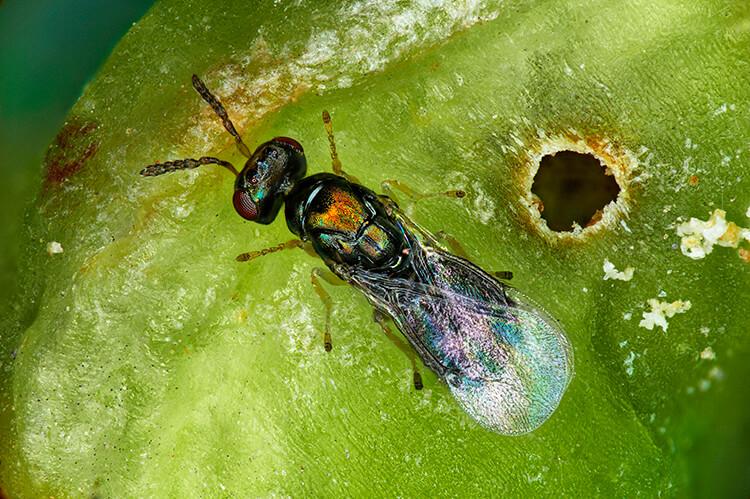- Home
- Worldwide
- CIRAD worldwide
- Projects
- EPIBIO-OI project
EPIdemiological surveillance and BIOcontrol in the South-west Indian Ocean - EPIBIO-OI

The micro wasp Leptocybe invasa is an invasive pest of Eucalyptus © A. Franck, CIRAD
Issues
The islands of the South-west Indian Ocean are some of the world’s top biodiversity hotspots. But this biodiversity is threatened by invasive alien species (IAS). Agricultural activities must also address the introduction of animal and plant species in these island territories.
The EpiBio-IO project aims to better understand these IAS and to help stakeholders to assess the risks associated with the introduction of these species.
Description
EpiBio-IO is a project implemented within the PRPV network (regional plant protection programme). The actions undertaken in the context of this project are aimed at strengthening capacities for the sustainable management of biodiversity in the Indian Ocean region. This biodiversity is protected through the ecological management of invasive macro-organisms and emerging plant diseases. The focus is on not only regional epidemiological surveillance of diseases and pests of agrosystems, but also on environmentally-friendly biocontrol solutions.
Expected changes
EpiBio will set up and consolidate a regional network for epidemiological surveillance and biocontrol. To achieve this:
- Inventories and databases of invasive alien species and pests will be made available for consultation.
- The different invasive alien species will be identified and listed. The study areas in the territory will be mapped in order to quantify the degrees of invasion.
- As regards harmful organisms, databases on crop pests (bacteria, viruses, insects, fungi, nematodes) and beneficials will be created.
- Identification tools will be implemented, as well as an online portal for the identification of pests and beneficials, along with a “Pl@ntnet” smartphone application for the collaborative identification of plants.
- Regional epidemiological surveillance of different diseases and pests will be improved.
- Biocontrol measures to combat diseases and pests will be strengthened.
Expected impacts
- Operational cooperation in plant epidemiological surveillance within the IOC and with the coastal countries of the Indian Ocean will be implemented through a skills network (PRPV);
- Agroecological protection strategies against pests will be implemented, simultaneously with the development of regional expertise in biocontrol engineering for regional agroecological or organic agriculture using appropriate tools.
Partners
Union of the Comoros
• INRAPE, Institut National de Recherche pour l’Agriculture, la Pêche et L’Environnement
• University of the Comoros (phase 1 only)
Madagascar
• University of Antananarivo
• FOFIFA, Centre National de la Recherche Appliquée au Développement Rural
• FIFAMANOR, Centre National de Développement Rural et de Recherche Appliquée
• DPV, Direction de la Protection des Végétaux du Ministère de l’Agriculture et de l’Élevage (MINAE)
• CEFFEL, Centre d’Expérimentation et de Formation en Fruits et Légumes, Fert
• CTHT, Centre Technique Horticole de Tamatave (phase 2 only)
Mauritius & Rodrigues
• Ministry of Agro Industry and Food Security
• FAREI, Food and Agricultural Research and Extension Institute
France – Reunion Island
• University of Reunion Island
• INRAE
• Chambre of Agriculture of Reunion Island
• DAAF Réunion, Direction de l’Alimentation de l’Agriculture et de la Forêt de la Réunion
• DEAL Réunion, Direction de l'Environnement, de l'Aménagement et du Logement de la Réunion
• ANSES, Agence Nationale de Sécurité Sanitaire de l'Alimentation, de l'Environnement et du Travail
• Volontaires pour la France
• FDGDON Réunion, Fédération Départementale des Groupements de Défense contre les Organismes Nuisibles de la Réunion (phase 1 only)
• GDS Réunion, Groupement de Défense Sanitaire de la Réunion
• FRCA Réunion, Fédération Régionale des Coopératives Agricoles de la Réunion (phase 1 only)
• ARMEFLHOR, Association Réunionnaise pour la Modernisation de l’Economie Fruitière, Légumière et Horticole à la Réunion (phase 1 only)
• Coccinelle © (phase 1 only)
Seychelles
• SAA, Seychelles Agricultural Agency
• NBA, National Biosecurity Agency (phase 1 only)
International
• IOC, Indian Ocean Commission
• IUCN, International Union for Conservation of Nature (phase 1 only)
• FAO/IAEA, Joint Division of the Food and Agriculture Organization of the United Nations and the International Atomic Energy Agency (phase 1 only)
























